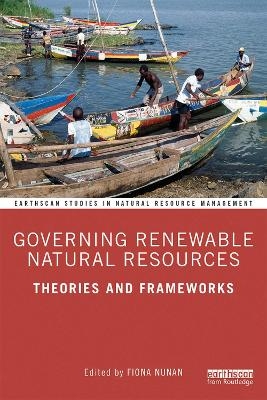
Governing Renewable Natural Resources
Routledge (Verlag)
978-0-367-14669-6 (ISBN)
Renewable natural resources are under pressure, with over-exploitation and degradation raising concern globally. Understanding governance systems and practice is essential for developing effective and fair solutions. This book introduces readers to key concepts and issues concerned with the governance of renewable natural resources and illustrates the diversity of approaches, theories and frameworks that have been used to analyse governance systems and practice. Each chapter provides an introduction to an area of literature and theory and demonstrates application through a case study. The book covers a range of geographical locations, with a focus on low- and middle-income countries, and several types of natural resources. The approaches and theories introduced include common property theory, political ecology, institutional analysis, the social -ecological systems framework and social network analysis. Findings from across the chapters support an analytical focus on institutions and local context and a practical focus on diverse, flexible and inclusive governance solutions.
The book serves as an essential introduction to the governance of renewable natural resources for students, researchers and practitioners.
Fiona Nunan is Professor of Environment and Development in the International Development Department, University of Birmingham, UK.
1. Introduction: governing renewable natural resources 2. Management in the guise of governance? Rethinking the Ends and the means of natural resource governance 3. Networked participation: how social network analysis can inform participatory processes in environmental governance 4. Analyzing natural resource governance with the social-ecological systems framework 5. Analysing institutions to explain the practice and outcomes of fisheries co-management 6. Community governance of common-pool resources: exploring institutional interfaces 7. Indigenous polycentric and nested customary sea-tenure (CST) Institutions: a Solomon Islands case study 8. Political ecologies of resource governance: ontologies, agency and practice 9. The state as a person: the role of interface bureaucrats in everyday natural resource governance 10. Institutional recognition politics in forestry: when the plurality of state law undermines local democracy 11. In search of new modes of governance: the potential of conservation incentive payment policies to promote human–wildlife co-existence 12. Conclusion: working towards diverse, flexible and inclusive natural resource governance
| Erscheinungsdatum | 10.12.2019 |
|---|---|
| Reihe/Serie | Earthscan Studies in Natural Resource Management |
| Zusatzinfo | 7 Tables, black and white; 6 Halftones, black and white; 6 Illustrations, black and white |
| Verlagsort | London |
| Sprache | englisch |
| Maße | 156 x 234 mm |
| Gewicht | 453 g |
| Themenwelt | Naturwissenschaften ► Biologie ► Ökologie / Naturschutz |
| Technik ► Umwelttechnik / Biotechnologie | |
| ISBN-10 | 0-367-14669-X / 036714669X |
| ISBN-13 | 978-0-367-14669-6 / 9780367146696 |
| Zustand | Neuware |
| Haben Sie eine Frage zum Produkt? |
aus dem Bereich


